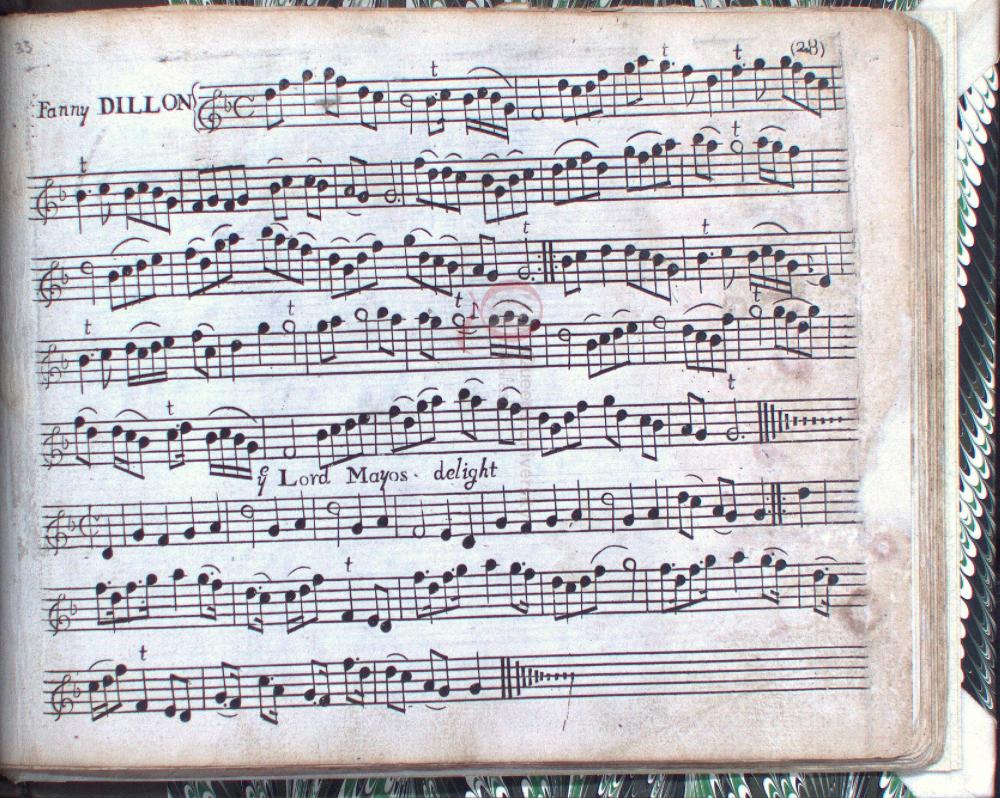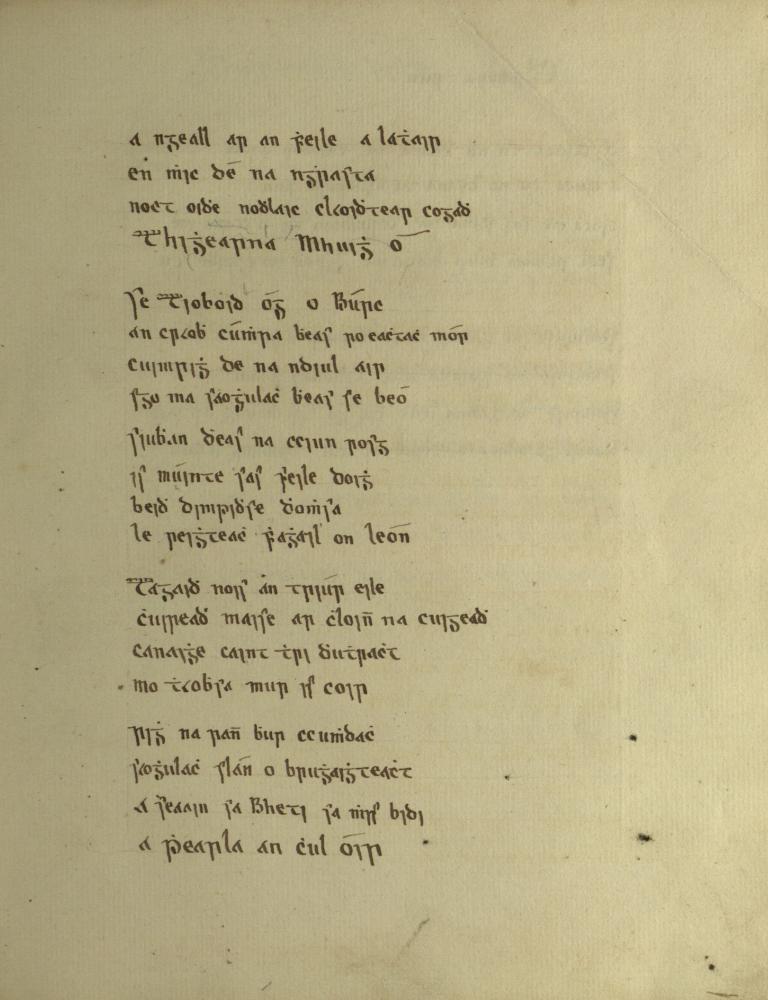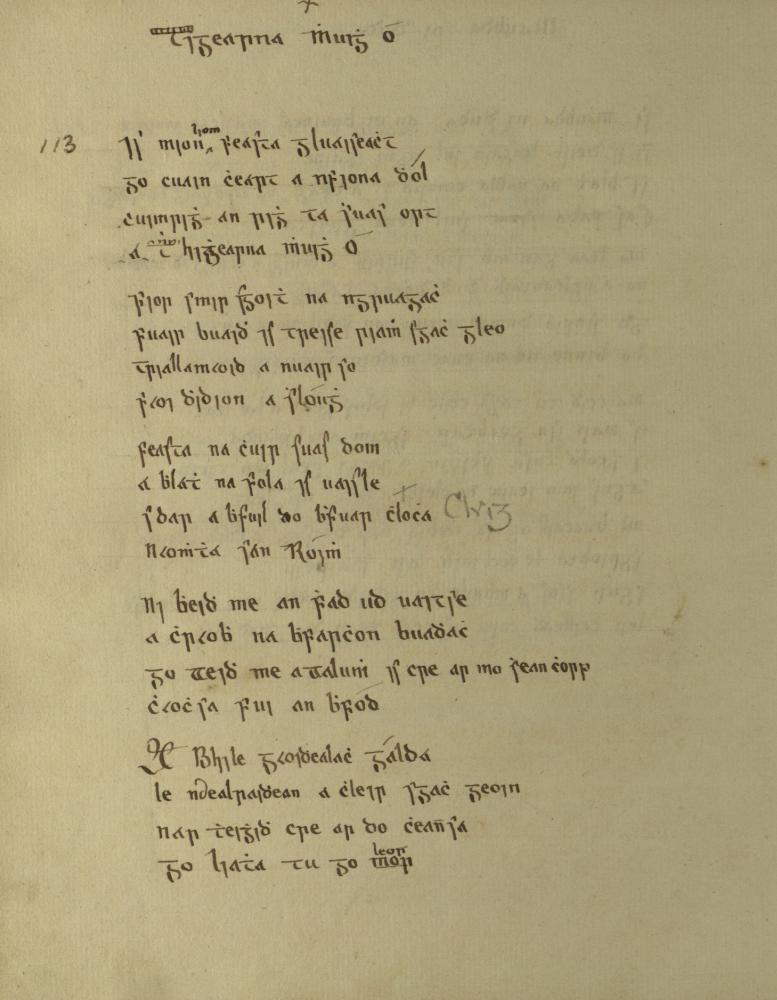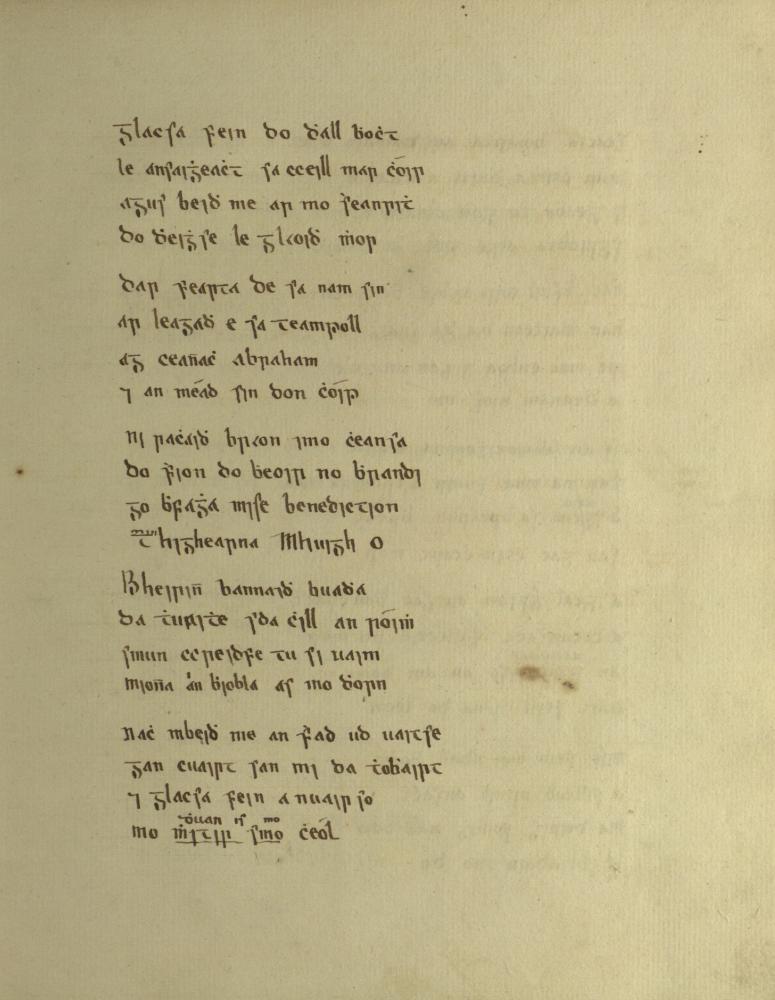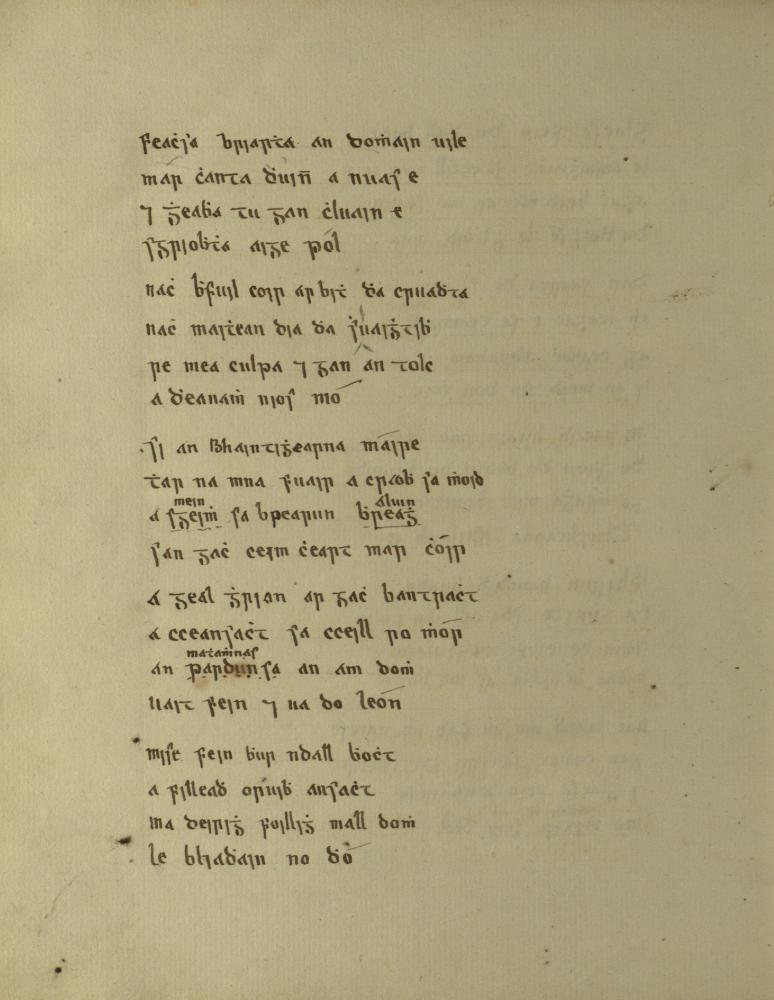Ye Lord Mayos Delight
| TYPE | 3 - Complex Melody |
| TOPIC | Praise |
| TUNE STRUCTURE | A7 B8 |
| VERSE STRUCTURE | 5v 16l |
| TIME SIGNATURE |

|
| KEY SIGNATURE | ♭ |
| TONAL CENTRE | G |
| INCIPIT | GDGAD'GAD'GAFE |
| GENRE | Amhrán Mór |
| TEXT SOURCE | Bunting Notebooks. Special Collections, QUB Library. MS 4.7 114 |
| TUNE SOURCE | A Collection of the Most Celebrated Irish Tunes (Dublin: John and William Neal, 1724), p.28 |
| FIRST LINE | Is mion liom feasta gluaiseacht |
| NOTATED INCIPIT | |
| Both Charles O’Conor of Belanagare and Arthur O’Neill attributed this tune to the harper Thady Keenan; but Bunting attributed it to David Murphy, a poor dependant of Lord Mayo. However Bunting may mistakenly have taken O’Conor’s attribution of the song-text to Murphy and assigned the tune to him also. This David Murphy is not to be confused with the famous eighteenth-century Irish harper of the same name (sometimes known also as O’Murphy or Morphy). See Nicholas Carolan, ed. Celebrated Irish Tunes (1986; 2010 revised ed.), p.100. | |
Tigearna Mhuigh ÓIs mion liom feasta gluaiseachtGo cuain cheart an fíona dh’ ól;Cuimrigh an Righ tá shuas ort,A Thighearna Mhuigh Ó!Fíor-sinsir sgoith na ngruagach,‘Fuair buaidh is treise riamh ‘s gach gleo,Triallamaoid an uair soFaoi dhídion a shlough.Feasta ná chuir suas dom,A bhláth na fola is uaisle,‘S dar a bhfuil do bhfuar-chlochaNaomhtha san RóimhNí bheidh mé an fhad úd uaitse,A chraobh na bhfarchon buadhach,Go dtéidh mé a dtalamh is créAr mo sheanchorp chaochsa fui an bhfód.A bhile Gaoidhealach-GaldaLe ndealraidhean a’ chléir ‘s gach geoin,Nár théighidh cré ar do cheannsaGo liatha tú go mór.Glacsa féin do dhall bhochtLe ansaigheacht sa gcéill mar ‘chóir,Agus beidh mé ar mo sheanrithDo dhéighse le glaoidh mhór.Dar féasta Dé san am sinAr leagadh é sa teampollAg ceannach AbrahamIs an méad sin don chóip,Ní racaidh braon i mo cheansaDo fhíon, do bheoir nó ‘bhrandy,Go bhfagha mise benedictionThighearna Mhuigh Ó.Bheirinn bannaidh buadhaDa thuaithe ‘s da chill an Róimh,‘S mun’ gcreidfe tú sí uaimMionna an Bhíobla ar mo dhornNach mbeidh mé an fhad úd uaitseGan cuairt san mí da thobhairt;Is glacsa féin an uair soMo dhuan is mo cheol.Féachsa briartha an domhain uileMar chanta dhúinn anuas é,Is gheabha tú gan chluain éSgríobhtha aige Pól,Nach bhfuil coir ar bith dhá cruadhtaNach maithean Dia dhá shuaightibhRé mea culpa is gan an t-olcA dhéanamh níos mó.‘S í an Bhaintighearna MáireThar na mná ‘fuair a’ craobh ‘s a’ mhóidA sgéimh ‘s a bpearsun bhreagh áluin‘S an gach céim cheart mar ‘chóir.A geal-ghrian ar gach bantracht,A gceansacht ‘s a gcéill ró-mhór,An pardúnsa an am domhUait féin is ua do leon!Mise féin bhur ndall bhochtA’ filleadh oruibh, ‘ansacht,Ina d’éirigh foilligh mall domhLe bliadhain nó dhó.A ngeall ar an fhéile a láthairÉn-Mhic Dé na ngrásta,‘Nocht oidhe Nodhlaic claoidhtear cogadh,‘Thighearna Mhuigh Ó.‘S é Tiobóid óg Ó BúrcAn craobh cúmhra ‘bhéas ró-éachtach mór;Cuimrigh Dé na ndiúl air‘s go ina saoghulach ‘bhéas sé beó!Siubhán dheas na gciún-rosg,Is múinte ‘s as féile dóigh,Beidh d’impidhse dhomhsaLe réighteach ‘fhaghail ón león.Tagaidh ‘nois an triúr eile,‘Chuireadh maise ar chloinn na cúigeadh,Canaighe caint thrí dhúthrachtMo Thaobhsa mur is cóir.Righ na rann bhur gcumhdach,Saoghulach slán ó brughaighteacht,A Seaain ‘s a Bhetí ‘s a mhín-Bidí,A phearla an chúl óir!QUB Bunting MS 7/114 (Suggested in Nicholas Carolan, 2010, pp.100-101)
Lord Mayo.I wish now to travel To the true resort of wine-drinking; The protection of the King who is above be upon you, Lord Mayo! The true ancestor of the best of heroes, Who always won victory and dominion in every battle, We go at this time Under the protection of his people. Do not from this time on put me from you, O flower of the most noble blood, And by all the cold Holy tomb-stones in Rome I will not be so long away from you, O branch of the victorious warriors, Until I go into the earth and the clay is On my blind old body under the sod. O hero of the Anglo-Irish Through whom the clergy succeed in every contest, May clay not go on your head Until you yourself are far more gray. Receive your poor blind man With affection in the proper sense, And I will be in my old manner Following after you with acclamations. By the victory of God at that time When he was laid in the tomb To purchase Abraham And the rest of the company, No drop will go into my mouth Of wine, of beer or of brandy, Until I get the blessing Of Lord Mayo. I would give binding sureties To the laymen and to the Church of Rome, And if you do not believe that from me, Then oaths with the Bible in my fist, That I will not be so long away from you Without paying a monthly visit; And let you receive at this time My poem and my music. See the words of the whole world As have been recited down to us, And you will find it without deceit Written down by St Paul, That there is not a crime, no matter how serious, That God does not forgive his people For a mea culpa and for not Doing the evil deed again. It is the Lady Mary Above all women who received the prize and the allegiance For her loveliness and her fine beautiful person And for every good quality, as is proper. O bright sun of all womankind, In gentleness and in intelligence the greatest, A timely pardon for me From yourself and from your lion! I am myself your poor blind man Returning to you both, my loves, I who have suffered long neglect For a year or two. For the sake of this present feast day Of the one Son of God of the graces, Tonight on Christmas Eve let the quarrel be done away with, O Lord Mayo. It is young Theobald Bourke Is the fragrant branch who will be powerful and great; The protection of God of the elements on him, And may he be long-lived! Lovely Joan of the gentle eyes, The most courteous and generous in manner, Your intercession for me Will achieve reconciliation with the lion. Come now, the other three, Who would adorn any family in the province, Speak earnestly On my behalf as is proper. The King of the regions preserve you, Long-lived and free from sorrow, John and Betty and gentle Biddy, The pearl of the golden hair!(Translated in Nicholas Carolan, 2010, pp.101-102)

